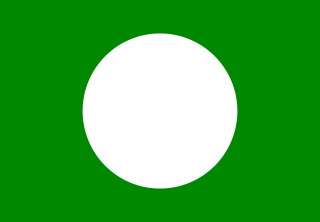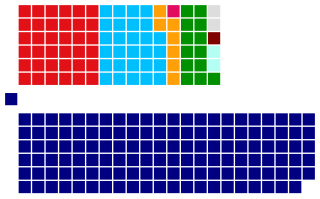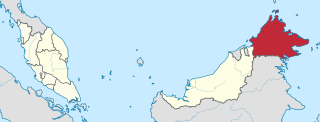
The Malaysian Islamic Party is an Islamist political party in Malaysia. PAS's electoral base is in Malaysia's rural and conservative north. The party has governed the east coast state of Kelantan twice and has also, in the past, formed governments in Terengganu, Perak (2008-2009), Kedah (2008–2013), Penang (2008-2015) and Selangor (2008-2018). The party currently holds 18 of the 222 seats in the federal House of Representatives and has elected parliamentarians or state assembly members in eight of the country's 13 states.

The Pan-Malaysian Islamic Front is a political party in Malaysia.

The Reformasi was a protest movement that began in September 1998 throughout Malaysia initiated by Anwar Ibrahim after his sacking as Deputy Prime Minister by the country's then-Prime Minister, Mahathir Mohamad in the same month. The massive movement, which was occurred while the country hosted the Commonwealth Games, consisted of civil disobedience, demonstrations, sit-ins, rioting, occupations and online activism, involving thousands across Malaysia protesting against the Barisan Nasional government under the Mahathir Cabinet.

A general election was held between Monday, 24 April and Tuesday, 25 April 1995 for members of the 9th Parliament of Malaysia. Voting took place in all 192 parliamentary constituencies of Malaysia, each electing one Member of Parliament to the Dewan Rakyat, the dominant house of Parliament. State elections also took place in 394 state constituencies in 11 out of 13 states of Malaysia on the same day.

Dato' Seri Haji Mukhriz bin Mahathir is an Malaysian politician who is the current Chief minister and Menteri Besar of the State of Kedah. From 2008 to 2013 he was the federal Deputy Minister of International Trade and Industry. He is the third son of Mahathir Mohamad, the current Prime Minister of Malaysia.

The Malaysian Indian Muslim Congress is a political party formed on 24 October 1976 to represent the interests of the minority Indian Muslim community in Malaysia. KIMMA was deregistered twice ever in 1978 and 1998 before it was successfully registered back. Majority members of KIMMA are Indian Muslim.

The Parti Melayu Semangat 46 or Spirit of 46 Malay Party (S46) is a now defunct Malaysian political party. The party was formed in 1988, and dissolved in 1996. It was formed by Tengku Razaleigh Hamzah's "Team B" faction of the United Malays National Organisation (UMNO), as a challenge to prime minister Mahathir Mohamad and UMNO. Razaleigh had the personal support of former UMNO prime ministers Tunku Abdul Rahman and Hussein Onn, both of whom had also fallen out with Mahathir.
Kuala Terengganu by-election of 2009 was held on 17 January 2009 after the death of the incumbent Member of Parliament, Razali Ismail. In the 2008 election, Datuk Razali won by a slim 628 vote majority, defeating Pan-Malaysian Islamic Party (PAS) heavyweight Mohamad Sabu and 89-year-old independent candidate, Maimun Yusuf. Prime Minister Datuk Seri Abdullah Ahmad Badawi and Barisan Nasional were confident that Barisan Nasional would retain the Kuala Terengganu parliamentary seat. The Prime Minister had rejected the assumption that there would be a big swing by the voters to the Opposition. Opposition leader Anwar Ibrahim stated that Parti Keadilan Rakyat (PKR) and the Democratic Action Party (DAP) would support any candidate that PAS picked. He was optimistic that Pakatan Rakyat would win in Kuala Terengganu if all its coalition parties worked hard against Barisan Nasional. In the 2008 election Razali, a government minister of the UMNO party, defeated a PAS opposition candidate by 628 votes. For the by-election PAS nominated state assemblyman Mohd Abdul Wahid Endut, while Barisan Nasional nominated Wan Ahmad Farid Wan Salleh. Mohd Abdul won the by-election by 2,631 votes.

The 2018 Malaysian general election, formally known as the 14th Malaysian general election, was held on Wednesday, 9 May 2018 for members of the 14th Parliament of Malaysia. At stake were all 222 seats in the Dewan Rakyat and 505 seats in 12 out of the 13 State Legislative Assemblies of Malaysia. The 13th Parliament of Malaysia was dissolved by the then Prime Minister Najib Razak on 7 April 2018. It would have been automatically dissolved on 24 June 2018, five years after the first meeting of the first session of the 13th Parliament of Malaysia on 24 June 2013.

This is a list of the members of the Dewan Rakyat of the 13th Parliament of Malaysia. The opposition coalition Pakatan Rakyat that contested the general elections in 2013 was dissolved after series of disagreements between two main parties, Democratic Action Party (DAP) and Pan-Malaysian Islamic Party (PAS). A new opposition coalition Pakatan Harapan was formed by the Democratic Action Party, People's Justice Party (PKR) and newly formed party National Trust Party (PAN), consisting of ex-PAS members. Several ex-UMNO members have also formed their own party Malaysian United Indigenous Party (PPBM) and have signed an electoral pact with Pakatan Harapan to contest the future general election and ensure straight fights against Barisan Nasional. On 20 March, 2017 PPBM officially became a member of Pakatan Harapan.

The 14th Selangor state election was held on 9 May 2018. The previous state election was held on 5 May 2013. The state assemblymen is elected to 5 years term each.

The Angkatan Perpaduan Ummah was an informal Malaysian political coalition.The political coalition was formed by Pan-Malaysian Islamic Party (PAS), Spirit of 46 Malay Party, Pan-Malaysian Islamic Front, Muslim People's Party of Malaysia and Malaysian Indian Muslim Congress before 9th Malaysian General Election. KIMMA left the coalition before the 10th Malaysian General Election. It formally disbanded after the election.

The Gagasan Rakyat was an informal Malaysian political coalition.The political coalition was formed by Democratic Action Party, Parti Bersatu Sabah, Malaysian People's Party, Indian Progressive Front and Malaysian Solidarity Party It were also joined by three other members from Angkatan Perpaduan Ummah, which were Spirit of 46 Malay Party, Muslim People's Party of Malaysia and Malaysian Indian Muslim Congress. On the 25th of January 1995, DAP withdrawn from the coalition.
Dato' Haji Hashim bin Jasin is a Malaysian politician from Pan-Malaysian Islamic Party (PAS). He is appointed as the Spiritual Leader of Syura Council replacing the late Tuan Guru Datuk Dr. Haron Din following Dr Haron’s death in San Francisco, United States due to heart complications. In 1998, he was elected as Member of Parliament for Arau in a by-election, and was state assemblyman for Sanglang (1999-2013), and Perlis PAS commissioner (1991-2013).
Tan Sri Datuk Seri Panglima Abdul Kadir bin Sheikh Fadzir is a Malaysian politician and former seven-term Member of Parliament (MP) of Malaysia representing Kulim-Bandar Baharu constituency in the state of Kedah. He also formerly served as the Minister of Information (1999-2006), Minister of Culture, Arts and Tourism (1997-2004) in the Cabinet of Malaysia.
The 14th Pahang State election will be held on or before 23 August 2018. The previous state election was held on 5 May 2013. The state assemblymen is elected to 5 years term each.




















